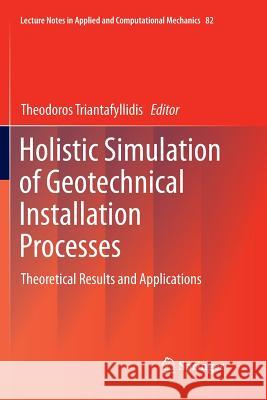Holistic Simulation of Geotechnical Installation Processes: Theoretical Results and Applications » książka
topmenu
Holistic Simulation of Geotechnical Installation Processes: Theoretical Results and Applications
ISBN-13: 9783319849423 / Angielski / Miękka / 2018 / 363 str.
Kategorie:
Kategorie BISAC:
Wydawca:
Springer
Seria wydawnicza:
Język:
Angielski
ISBN-13:
9783319849423
Rok wydania:
2018
Wydanie:
Softcover Repri
Ilość stron:
363
Waga:
0.52 kg
Wymiary:
23.39 x 15.6 x 1.96
Oprawa:
Miękka
Wolumenów:
01
Dodatkowe informacje:
Wydanie ilustrowane











